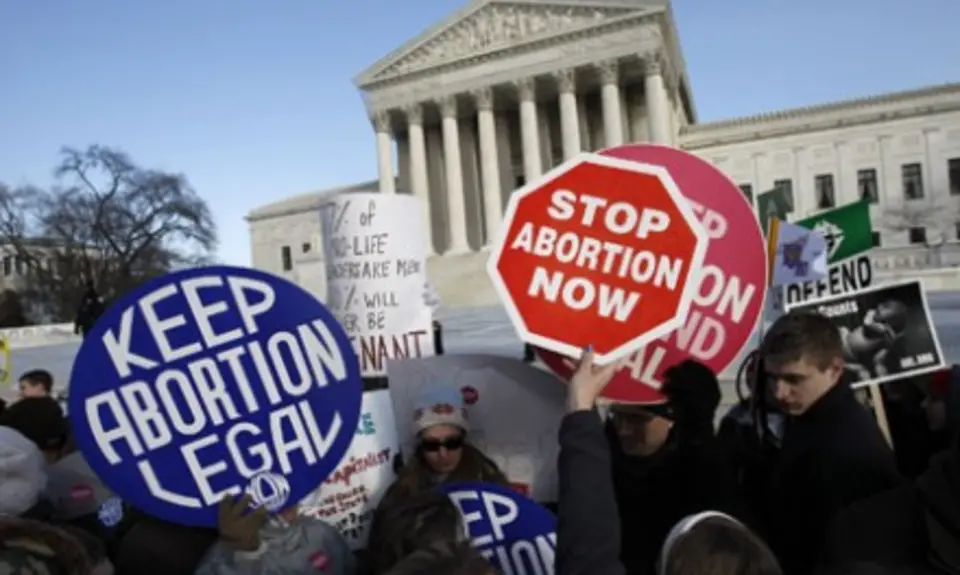Donald Trump’s presidential election victory has energized the anti-abortion-rights movement both at the national level, where many leaders endorsed Trump in exchange for his explicit promises to support their policy agenda, and at the state level, where lawmakers are already citing Trump’s future Supreme Court picks as they attempt to push the bounds of Roe v. Wade with more and more extreme laws.
As 2017 begins, here are some of the trends we’re watching in the movement to restrict reproductive freedom.
Supreme Court Nominations
Thanks to Republicans in Congress holding open the late Justice Antonin Scalia’s Supreme Court seat for more than a year, one of Trump’s first items of business as president will be nominating a new justice to the court. During his campaign, Trump all but promised to hand over that decision to conservative groups, vowing to pick a justice off two short lists generated by the Federalist Society and the Heritage Foundation, and explicitly promising opponents of abortion rights that he would name “pro-life” justices to the court, thereby advancing their long-term goal of overturning Roe v. Wade.
Along with threatening Roe v. Wade—which a Pew poll released today finds 69 percent of Americans are in favor of keeping—a Supreme Court stocked with justices hand-picked by major conservative groups could turn back advances in contraception access, equal pay, LGBT equality and other areas.
20-Week Abortion Bans
Another promise that Trump made to anti-abortion leaders was that he would sign a federal 20-week abortion ban, which while it would only affect a tiny percentage of abortions has been at the center of the anti-choice movement’s recent attempts to undermine Roe v. Wade.
Similar laws have been passed in 15 states, a trend that is likely to continue into the new year. Most recently, Ohio Gov. John Kasich signed such a bill in December.
Planned Parenthood Funding & ACA Repeal
In a letter to anti-choice leaders in September, Trump promised to sign legislation “defunding Planned Parenthood as long as they continue to perform abortions.” GOP leaders have indicated that they’ll package together a repeal of the Affordable Care Act and a measure stripping federal reimbursements from Planned Parenthood in a budget reconciliation bill requiring just a simple majority to pass in the Senate, as they did last year.
Federal funds cannot, by law, go toward Planned Parenthood’s abortion services except in very limited cases. Instead, the federal funding that goes to Planned Parenthood through Medicaid reimbursements and Title X helps to fund services like STD and STI screenings and affordable contraception for low-income patients.
Repealing the Affordable Care Act would also do tremendous harm to contraception access by removing the requirement that most insurance plans cover contraceptives without copays and would eliminate a number of services for pregnant women.
Trump has already taken a step in this direction by nominating Rep. Tom Price, an abortion rights opponent with a dismal record on birth control access, to head the Department of Health and Human Services.
Planned Parenthood Prosecution
Not content with simply gutting federal support for Planned Parenthood’s women’s health services, may anti-choice groups are also hoping that a Trump administration will take on the provider in the courts as well. Republican Sen. Chuck Grassley, cheered on by anti-choice groups, is urging the Justice Department to investigate unsubstantiated claims that Planned Parenthood has illegally profited from the sale of fetal tissue for medical research.
Unsurprisingly, one of the biggest proponents of this is Operation Rescue, the radical anti-choice group behind the fetal tissue story. Operation Rescue’s Troy Newman—who once wrote that the government has a God-ordained responsibility to execute abortion providers—celebrated Trump’s nomination of Alabama Sen. Jeff Sessions to be attorney general by declaring, “A new sheriff is coming to town and the era of old corrupt politicians who have shielded Planned Parenthood from the consequences of their illegal behavior is about to come to an end.”
Reproductive Rights Overseas
Since 1984, Republican and Democratic administrations have alternated imposing and dismantling the Mexico City Policy, also known as the Global Gag Rule, which prohibits U.S. foreign aid recipients from providing or advocating for abortion access. With Trump in the White House, anti-choice groups are hoping to see the policy reinstated, possibly even with a catchier name.
Social conservative groups are also hoping that Trump’s State Department will reverse Obama administration moves in favor of LGBT and reproductive rights around the world, with the Family Research Council hoping that “LGBTQ and abortion activists” will be “ferreted out” of the department. Already, Trump’s transition team has alarmed State Department employees by demanding information on the department’s gender equality programs.
Extreme Bills In The States
In what may be a sign of things to come, Ohio’s legislature passed a bill last month that would have banned abortions at about six weeks of pregnancy, or before many women even know that they are pregnant. The so-called “heartbeat bill,” which was the brainchild of radical Religious Right activist Janet Porter, was clearly unconstitutional under Roe v. Wade, but one state Republican leader said he allowed the bill to move forward because Trump had “changed the dynamic” around the Supreme Court.
Kasich, the Ohio governor, vetoed the “heartbeat bill” even while signing the damaging 20-week ban, but it could signal a willingness of state legislatures to take even bolder anti-Roe stances in the hopes that they’ll catch a break with Trump’s courts.








